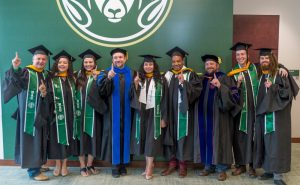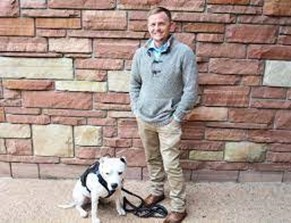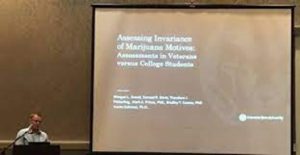 Masters in Addiction Counseling in Psychology
Masters in Addiction Counseling in Psychology
The Masters in Addiction Counseling in Psychology Program offered through the Department of Psychology at Colorado State University provides students with the knowledge and skills necessary to provide addiction counseling treatment services. Upon completion, students will receive a Masters in Addiction Counseling in Psychology and should be eligible to sit for the Masters in Addiction Counseling Exam to become a Licensed Addiction Counselor. Completion of the coursework in the first year covers all of the required instruction for licensure in the State of Colorado. While some students complete their practice hours needed for licensure during internship, most students finish their licensure hours after graduation, building on the hours they complete as a part of the internship year.
The program of study is 2 years that consist of one year on campus taking classes and one year off campus completing an addiction counseling internship. Hours completed on the internship count towards licensure. Completion of the coursework in the first year covers all of the required instruction for licensure in the State of Colorado. The program is considered a Plan C Masters Program, meaning that a research thesis is not required, instead competency is demonstrated through successful completion of the internship process and passing of a comprehensive examination.
Currently, both in Colorado and across the nation, there is shortage of Licensed Addiction Counselors. We anticipate graduates of the Masters Program in Addiction Counseling in Psychology at Colorado State University will be highly employable.
The Master’s of Addiction Counseling in Psychology Program at Colorado State University is accredited through NASAC until December 31st, 2028.
In order to be considered for admission to the Masters in Addiction Counseling in Psychology at Colorado State University you must hold a Bachelor’s Degree with an emphasis on behavioral health (e.g., Psychology, Social Work, Nursing, or Human Development and Family Studies). Additionally, ideal candidates will have an undergraduate cumulative GPA of at least 3.0 and will have a strong desire to help those struggling with addictions.
Handbook for Addiction Counselors – You can access the Handbook for Addictions Counseling from the link by selecting the option titled “CAC Training Program Handbook for Addiction Counselors”
The application priority deadline is March 1st. All materials received by March 1st of the year you plan to enroll will be given full consideration for admission. Applications may be submitted after March 1st of the year you plan to enroll, however, applications received after March 1st of the year you plan to enroll will be reviewed on a rolling basis until all spaces are filled for that year. If you apply after March 1st, please email Rebecca Breniman at rebecca.breniman@colostate.edu and indicate that you have submitted an application.
| Year 1 | ||
|---|---|---|
| Fall | ||
| PSY 612 | Introduction to Addiction Counseling | 3 |
| PSY 620 | Addiction Counseling Concepts | 4 |
| PSY 675 | Ethics | 3 |
| PSY 724 | Motivational Interviewing | 3 |
| Total Units and Hours | 13 | |
| Spring | ||
| PSY 613 | Advanced Addiction Counseling | 3 |
| PSY 726 | Neuropharmacology of Addiction | 3 |
| PSY 775 | Treating Diverse Populations | 3 |
| PSY 793 | Clinical Supervision of Addiction Counseling | 3 |
| Total Units and Hours | 12 |
| Year 2 | ||
|---|---|---|
| Fall | ||
| PSY 787 | Internship | 9 |
| Total Units | 9 | |
| Spring | ||
| PSY 787 | Internship | 9 |
| Total Units | 9 | |
| Total Units | 43 |
The program leaders recognize that most students maintain employment in the community during their time in the program, so classes are set up in a way that allows students to work when they are not in classes. During the first year in the program (both in the fall and spring semesters), students are expected to be in classes on campus on Tuesdays and Wednesdays from 9:00am to 4:30pm.
Students in the Masters of Addiction Counseling in Psychology program can simultaneously take four additional courses that are required to be eligible for the professional counselor licensing exam by equivalency (Note that the Masters in Addiction Counseling in Psychology is NOT a CACREP Accredited Program). Students can pursue the licensed professional counselor by equivalency by altering their degree progress plans to include four courses and increasing their internship credits from nine to twelve units in the fall and spring semesters of the second year. By increasing from nine to twelve units during the second-year internship, students will be required to completed 480 clinical hours each semester instead of 360 hours.
The 4 extra courses are:
- PSY624: Career Counseling
- Online course
- HDFS505: Human Development
- Online course, typically offered in the summer
- PSY671: Assessment for Addictions Counseling
- Online course, offered during the summer
- PSY654: Research Methods in Counseling
- Online course, offered during the summer
Note: Some of these classes are not offered by the Psychology Department and fill up quickly. It is your responsibly to register as soon as you can to make sure you get into the class. If you take any classes the summer after your second spring, this will delay your “official” graduation to summer. You can still walk and participate in the spring graduation ceremony, but you will not receive your official degree until after summer session is completed.
Students cannot begin counting hours towards LPC licensure until after they have earned their Masters degree. There is no Post-Master of Arts requirement for the Licensed Addiction Counselor so students’ hours during internship count toward their license.
Handbook for Addiction Counselors – You can access the Handbook for Addictions Counseling from the link by selecting the option titled “CAC Training Program Handbook for Addiction Counselors”
LPCC Application
- Inform your advisor that you are pursuing the LPC courses, you will be taking more classes, and your internship credits and hours will increase.
- Make sure that you save all of your course syllabi and course descriptions in a document if you will be applying for this license! You will need this information for licensure.
- To access the course description, you can go to the CSU website here: https://catalog.colostate.edu/general-catalog/courses-az/psy/. This link is for the Psychology Department courses. If you are looking for courses offered in other departments, you will click on the appropriate department name and it should pull up their list of courses with descriptions.
CSU has a spotless reputation for graduating all students who have been admitted into the Masters in Addiction Counseling in Psychology program. Many students secure employment before graduating from the program based on their expertise and passion for treating individuals facing addiction. Alumni of the program are some of the most revered in the field based on their specialized knowledge of addictions.
Student Admissions and Outcome Statistics
“The most positive part of my experience in the Master’s of Addiction Counseling Psychology Program was the people – particularly the instructors and advisor. The fact that [the professors] really knew each of us has made all the difference for me.” – Class of 2020 Alumni
Comprehensive List of Internship Sites
Students begin their internship after completing all coursework for their Masters of Addiction Counseling in Psychology degree. Although each site is unique, students can gain experience working at sites that treat individuals struggling with addictions by conducting individual and group counseling, engaging in case management and consultation, and providing other general services. Students will complete between 360 and 480 clinical hours per semester on site under the supervision of a licensed addiction counselor. Students in the MACP program at CSU have gained funding during and/or employment after internship with their site on a case-by-case basis.
Colorado Department of Regulatory Agencies
Handbook for Addiction Counselors – You can access the Handbook for Addictions Counseling from the link by selecting the option titled “CAC Training Program Handbook for Addiction Counselors”
Click here to support the Morgan Sneed Memorial Scholarship
 Morgan Sneed passed away on 11/18/2020. The cause of death is unknown at this time. For those who knew Morgan, you know what a significant loss this is. For those of you who didn’t know Morgan, he was a graduate of Psychology and the Certified Addiction Counselor Concentration at Colorado State University. He was a graduate of the second cohort of the Masters in Addiction Counseling in Psychology program, also at CSU. He was a member of our family, a member of the Development of Risky and Addictive Behaviors Lab.
Morgan Sneed passed away on 11/18/2020. The cause of death is unknown at this time. For those who knew Morgan, you know what a significant loss this is. For those of you who didn’t know Morgan, he was a graduate of Psychology and the Certified Addiction Counselor Concentration at Colorado State University. He was a graduate of the second cohort of the Masters in Addiction Counseling in Psychology program, also at CSU. He was a member of our family, a member of the Development of Risky and Addictive Behaviors Lab.
More than any of that, Morgan was a good man and a better friend. He was committed to helping people even as he dealt with his own issues. He was selfless. He was an advocate. He loved dogs, both his and yours. He would do just about anything for just about anyone who asked. He loved to cook and he was great at it. He was committed to helping others.
Morgan was a veteran who served in Iraq and Afghanistan. He was injured in combat. He was a hero. He had a traumatic brain injury and post-traumatic stress disorder and he spoke openly about how this affected him. You can read more details about this here: https://collegian.com/2017/10/living-with-ptsd-csu-veteran-overcomes-trauma-to-developrecovery-program/. Because of his PTSD, he had a service dog, Dakota. Dakota was also part of our family.
Morgan was the exact type of person who should be in the counseling profession. He was always trying to better himself so he could be more effective when helping others. He went to specialized trainings and studied treatment methods in his spare time. He wanted to open his own sober living facility so that he could help others struggling with substance use disorders, and he was also interested in researching trauma and trauma treatments.
Morgan worked hard at everything he did and, while not always successful, I watched him do far more with far less than most people I know. He joined our research lab but had very little experience doing scientific research. He attended our lab meetings in his free time and soaked up as much information as he could. When a project presented itself comparing the psychometrics of a cannabis use motives scale in a veteran population compared to a college student population, he jumped in with both feet and took the lead. He taught himself about invariance testing, and he had a better grasp of it than most Ph.D. students I know who have studied the topic. We were working on writing this project up in manuscript from when Morgan passed. 
I have never been more impressed with Morgan than when I watched him present research at a conference a few summers ago. He taught himself so much in such a short period of time. He was anxious to present in front of an audience of scientists, all of whom he assumed knew more than he did. Even though we told him he was wrong, that he was ready, we couldn’t convince him. Morgan got up and gave one of the best presentations I have ever seen, and then he came over and apologized to me for not representing the lab better. That was who Morgan was.
Morgan recently purchased his first home in Loveland. He was planning to apply to Ph.D. programs this December. He wanted to get a Ph.D. in Clinical or Counseling Psychology. He wanted to research trauma so that he could develop more effective trauma treatments.
I was lucky enough to have Morgan call me one of his mentors. I benefitted from the relationship at least as much as he did. Morgan taught me a lot in a short period of time, mostly about character, drive, determination, and about how to be a better person. For that, I am forever grateful. Morgan was a part of our family and will be sorely missed by all of us who knew him well.
Second generation teacher builds legacy of inclusion at CSU
An interview with Dr. Bradley Conner about the Masters in Addiction Counseling in Psychology Program
Psychology master’s student turns personal heartache into a fulfilling career
CSU graduate student helping youth affected by addiction
Colorado State University Launching Marijuana Addiction Treatment Program
CSU initiates programs to study, help understand drug use nationwide
Colorado Association of Addiction Professionals (CAAP)
NAADAC, the Association for Addiction Professionals
Colorado Department of Regulatory Agencies
Handbook for Addiction Counselors – You can access the Handbook for Addictions Counseling from the link by selecting the option titled “CAC Training Program Handbook for Addiction Counselors”
Rebecca Breniman
Email: rebecca.breniman@colostate.edu
Phone: (970) 491-1538
